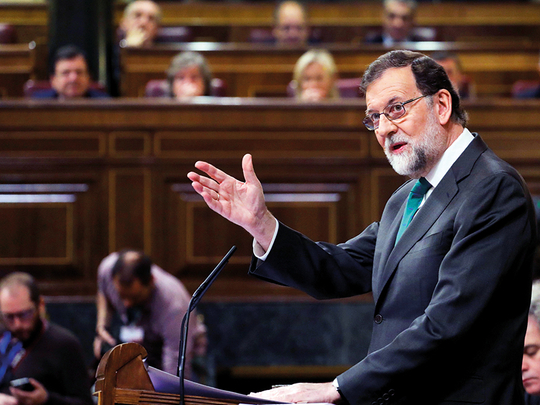
MADRID: Smaller political parties hold the key to the survival of conservative Mariano Rajoy as Spain’s prime minister after centrist group Ciudadanos refused to support a motion of no-confidence in parliament due on Friday.
Opponents are taking advantage of Rajoy’s weak minority government and a court ruling last week that sentenced dozens of people linked to his People’s Party (PP) to decades in prison in a long-running corruption trial.
With little more than 12 hours to go before the fragmented parliament begins debate on the motion presented by the main opposition Socialists, the Basque region’s nationalist ruling party said it would meet on Thursday to decide how to vote.
The Basque Nationalist Party “will announce its decision once it hears the Socialists’ motivations for presenting the motion and knows what (Socialist leader) Pedro Sanchez commits to do,” it said on Twitter.
The bid to end Rajoy’s six-year rule would also need backing from parties that campaign for an independent state in Catalonia.
Rajoy said in parliament on Wednesday he intended to carry out his four-year term without calling an early election. But opposition parties are expected to continue to try to oust him even if the vote fails.
Ciudadanos (Citizens), which has led some opinion polls in recent months, would be open to proposing a second motion of no-confidence with an independent candidate and an eye to calling an early election, its leader Albert Rivera said.
In an interview with COPE radio station, Rivera said the Socialists had turned down this plan.
‘Frankenstein government’
Sanchez has put himself forward as the alternative candidate for leader and offered to agree with other parties on a date for fresh elections.
Teneo Intelligence analyst Antonio Barroso said the chances were rising that Sanchez could succeed in toppling Rajoy, but the Socialists would be unlikely to make drastic changes to some of Spain’s most sensitive policy.
“Even if the motion succeeds, it is unlikely that a (Socialist) minority government would fundamentally challenge European Union fiscal rules or negotiate controversial measures such as a self-determination referendum for Catalonia,” Barroso said in a note.
So far, leftist party Podemos, which was founded in 2014 and fed off voter frustration with economic inequality and alleged corruption during a biting recession, has pledged its backing.
Podemos leader Pablo Iglesias, whose party holds 67 seats in parliament, would support the motion of no-confidence, he said in an interview with La Sexta television on Wednesday.
Even so, the joint votes with the Socialists fall short of the minimum 176 votes required to unseat Rajoy.
“If it fails, as of Friday we will get to work on throwing out the PP,” Iglesias added.
Rivera dismissed any partnership with Podemos and the regional parties, branding them “separatists and populists”.
“A strong legitimate government arising from elections will give much more stability to Spain than a ‘Frankenstein government’ with a parliamentary minority,” he said.
Parliamentary debate is expected to start at 0700 GMT on Thursday, with a clearer picture of whether the motion will pass likely to emerge later in the day as the smaller parties speak.











